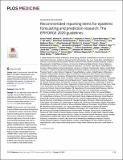Recommended reporting items for epidemic forecasting and prediction research : the EPIFORGE 2020 guidelines
Abstract
Background The importance of infectious disease epidemic forecasting and prediction research is underscored by decades of communicable disease outbreaks, including COVID-19. Unlike other fields of medical research, such as clinical trials and systematic reviews, no reporting guidelines exist for reporting epidemic forecasting and prediction research despite their utility. We therefore developed the EPIFORGE checklist, a guideline for standardized reporting of epidemic forecasting research. Methods and findings We developed this checklist using a best-practice process for development of reporting guidelines, involving a Delphi process and broad consultation with an international panel of infectious disease modelers and model end users. The objectives of these guidelines are to improve the consistency, reproducibility, comparability, and quality of epidemic forecasting reporting. The guidelines are not designed to advise scientists on how to perform epidemic forecasting and prediction research, but rather to serve as a standard for reporting critical methodological details of such studies. Conclusions These guidelines have been submitted to the EQUATOR network, in addition to hosting by other dedicated webpages to facilitate feedback and journal endorsement.
Citation
Pollett , S , Johansson , M A , Reich , N G , Brett-Major , D , Del Valle , S Y , Venkatramanan , S , Lowe , R , Porco , T , Berry , I M , Deshpande , A , Kraemer , M U G , Blazes , D L , Pan-Ngum , W , Vespigiani , A , Mate , S E , Silal , S P , Kandula , S , Sippy , R , Quandelacy , T M , Morgan , J J , Ball , J , Morton , L C , Althouse , B M , Pavlin , J , van Panhuis , W , Riley , S , Biggerstaff , M , Viboud , C , Brady , O & Rivers , C 2021 , ' Recommended reporting items for epidemic forecasting and prediction research : the EPIFORGE 2020 guidelines ' , PLoS Medicine , vol. 18 , no. 10 , e1003793 . https://doi.org/10.1371/journal.pmed.1003793
Publication
PLoS Medicine
Status
Non peer reviewed
ISSN
1549-1277Type
Journal article
Rights
This is an open access article, free of all copyright, and may be freely reproduced, distributed, transmitted, modified, built upon, or otherwise used by anyone for any lawful purpose. The work is made available under the Creative Commons CC0 public domain dedication.
Description
Funding: MIDAS Coordination Center and the National Institutes of General Medical Sciences (NIGMS 1U24GM132013) for supporting travel to the face-to-face consensus meeting by members of the Working Group. NGR was supported by the National Institutes of General Medical Sciences (R35GM119582). Travel for SV was supported by the National Institutes of General Medical Sciences (1U24GM132013-01). BMA was supported by Bill & Melinda Gates through the Global Good Fund. RL was funded by a Royal Society Dorothy Hodgkin Fellowship.Collections
Items in the St Andrews Research Repository are protected by copyright, with all rights reserved, unless otherwise indicated.

